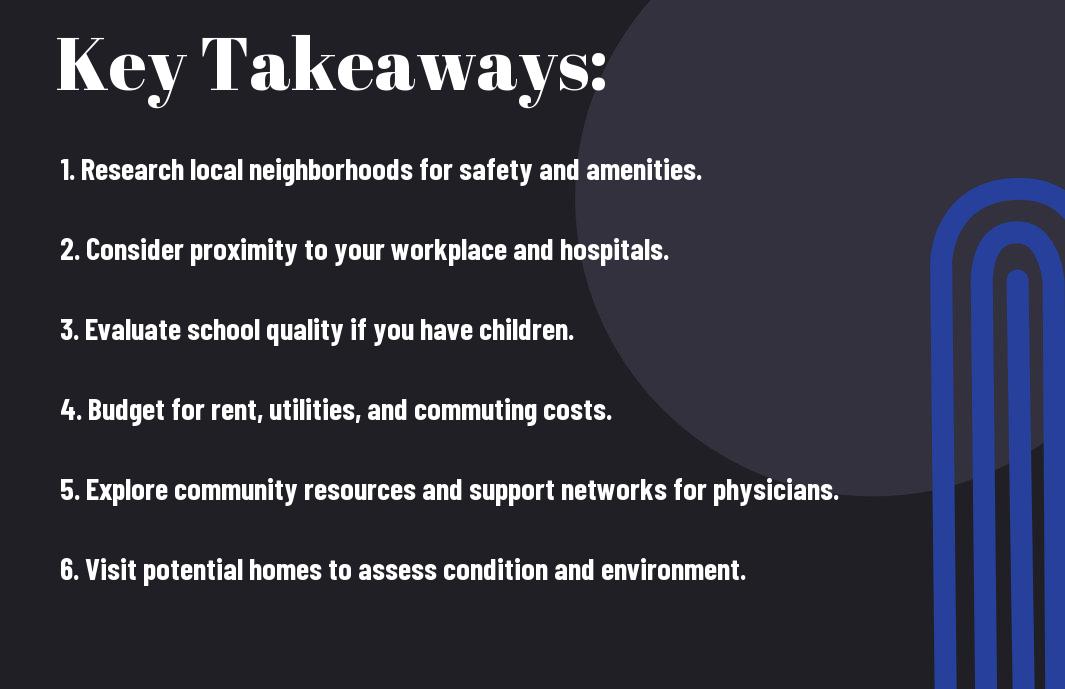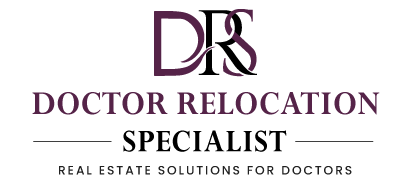Most physicians face unique challenges when relocating, making it imperative to have a clear checklist in hand to guide your housing search. Whether you’re moving for a new residency, fellowship, or established practice, understanding the nuances of your new community can significantly influence your experience and wellbeing. This post will equip you with practical tips and considerations to help you find the ideal housing that meets your needs, ensuring you feel at home in your new environment.

Understanding Your Housing Needs
While navigating a new community, it’s necessary to identify your unique housing needs. Consider factors such as the size of your household, lifestyle preferences, and proximity to work and amenities. By understanding what is most important to you, you can streamline your search and find a home that fits seamlessly into your new life.
Assessing Your Budget
Beside identifying your housing needs, assessing your budget is vital in determining what you can afford. Take into account not only monthly rent or mortgage payments but also utilities, maintenance costs, and potential homeowner association fees. Establishing a clear budget will allow you to narrow your options effectively without overextending your finances.
Determining Space Requirements
Along with budgeting, determining space requirements will help define what type of home suits you best. Consider factors such as the number of bedrooms and bathrooms needed, as well as any additional spaces, such as a home office or garden, that would enhance your living experience.
Assessing your space requirements involves reflecting on your lifestyle and preferences. Think about how often you host guests, the need for work or study areas, and whether outdoor space is important to you. Balancing your personal needs with your budget will aid you in finding a home that provides the right amount of space, ensuring comfort and functionality for your daily life.
Researching Potential Neighborhoods
There’s much to consider when researching potential neighborhoods for your new home. From safety statistics to school ratings, you will want to assess various factors that will impact your quality of life. Spend time exploring local amenities, community culture, and housing options to ensure that your new environment aligns with your personal and professional needs.
Evaluating Proximity to Work
An imperative aspect of your neighborhood search is evaluating how close you are to your workplace. A shorter commute can greatly enhance your work-life balance by providing you more time for personal activities and reducing stress. Take into account the availability of public transportation and traffic patterns to make an informed decision.
Considering Community Amenities
The amenities available in a community can significantly impact your living experience. Look for grocery stores, parks, gyms, and medical facilities that meet your needs and preferences.
For instance, access to quality healthcare facilities is particularly important for physicians, while proximity to recreational areas can enhance your well-being. Schools, restaurants, and shopping options also play a role in creating a fulfilling lifestyle. Engaging with current residents can provide valuable insights into the neighborhood dynamics and amenities, helping you to better assess whether the area is the right fit for you.
Navigating the Housing Market
All prospective homeowners must familiarize themselves with the intricacies of the housing market. This involves understanding the current trends, recognizing the fluctuations in prices, and knowing the best neighborhoods that match your lifestyle needs. Researching various communities will aid you in making informed decisions for your new living arrangement.
Types of Housing Options
Beside traditional homes, there are various housing options available to you:
| Single-Family Homes | Detached houses providing privacy and space. |
| Townhouses | Shared walls with neighbors, typically two or three stories. |
| Condos | Individual ownership with shared amenities in a larger building. |
| Apartment Rentals | Flexible rental options in urban settings. |
| Co-ops | Ownership shares in a building, requiring board approval. |
Perceiving these housing options will guide your decision-making process based on your preferences and budget.
Working with Real Estate Professionals
Along your housing search journey, teaming up with qualified real estate professionals can enhance your experience. They possess in-depth knowledge of the local market, can provide valuable insights, and help you negotiate favorable terms.
In addition to their expertise, real estate professionals can assist you in understanding paperwork, navigating the financing process, and even recommending trusted service providers. Their support streamlines the buying or renting process, ultimately empowering you to find the perfect home that aligns with your needs and budget throughout your community transition.
Touring Properties
For physicians relocating to a new community, touring properties is a vital step in your housing search. It allows you to assess the space firsthand, visualize your life there, and better understand the local neighborhood. Be sure to take notes and photos during your visits, as it can be easy to forget details after multiple tours. Prioritize properties that align with your lifestyle and professional commitments to ensure a smooth transition.
Essential Features to Inspect
Beside aesthetics, focus on the important features of a property during your tour. Check for the functionality of appliances, the quality of plumbing and electrical systems, and the condition of windows and doors. Don’t overlook storage space, parking availability, and the home’s layout, as these can significantly impact your daily life. By assessing these elements, you’ll develop a clearer picture of how well the property suits your needs.
Questions to Ask During Showings
Inspect the property thoroughly, but don’t hesitate to ask important questions during your showings. Inquire about previous maintenance issues, whether there are any ongoing repairs, and how long the property has been on the market. Understanding the local community, including schools, amenities, and transportation options, is equally important. Getting insights from the current owner or agent can provide valuable information that might not be immediately visible.
With each showing, ensure you’re clear on the property’s history and any potential red flags. Asking about the neighborhood’s safety, community engagement, and noise levels can also greatly inform your decision. Additionally, be curious about typical utility costs and any restrictions or rules on property modifications. These inquiries will not only provide you with important information but also give you a sense of how well the property aligns with your expectations and lifestyle.
Understanding Lease Agreements
Despite the complexity of lease agreements, mastering them is vital to ensure you’ve secured a suitable living situation. Leases can vary significantly in terms of duration, costs, and stipulations, making it vital for you to thoroughly understand the terms before signing. Misunderstandings can lead to conflicts and complications, so take your time reviewing each aspect carefully.
Key Terms and Conditions
Against what you may think, lease agreements are not solely about monthly rent. You’ll find significant terms pertaining to the lease duration, security deposits, maintenance responsibilities, and policies concerning pets or subletting. Familiarizing yourself with these key elements will help you avoid surprises later on.
Tenant Rights and Responsibilities
After signing a lease, you have specific rights as a tenant that protect you from unfair practices. Knowing your responsibilities, including timely rent payments and maintenance upkeep, helps establish a good tenant-landlord relationship. This understanding empowers you to advocate for yourself if issues arise.
It’s important to know that as a tenant, you have the right to a safe and habitable living environment. This includes adequate heating, plumbing, and maintenance of common areas. Your responsibilities typically encompass paying rent on time and notifying the landlord about any necessary repairs. Understanding these rights and responsibilities will help you navigate your new housing situation and ensure a positive rental experience.

Moving Logistics
Once again, it’s time to focus on the practical aspects of your relocation. Organizing the logistics of your move can make the transition to your new community smoother and less stressful. Take time to assess what belongings you’ll take with you, decide whether to hire professional movers or manage the move yourself, and create a timeline for packing and loading. Planning these details early will help you tackle the logistics effectively as your moving day approaches.
Planning Your Move
One of the first steps in planning your move is creating a detailed checklist. It’s important to outline tasks such as notifying utilities and changing your address, along with sorting and packing your belongings. Consider the timing of your move as well; if you can, aim for off-peak seasons to save on costs and secure availability with moving companies. Make arrangements well in advance to ensure a seamless transition into your new space.
Settling Into Your New Home
Moving into a new home is just the beginning of another chapter in your life. As you start to settle in, take time to familiarize yourself with your new surroundings. Explore the neighborhood, meet your neighbors, and locate crucial services such as grocery stores and medical facilities. Personalizing your space can also help you feel more at home, whether that’s through arranging furniture or adding personal touches to your decor.
Home should be a sanctuary where you feel comfortable and relaxed. As you unpack and organize your belongings, designate areas for specific uses, such as work, relaxation, and hobbies. This can help you create a functional living space that meets your lifestyle needs. Additionally, getting involved in local community activities can ease the adjustment process by forging new connections and enriching your experience in your new environment.
To wrap up
To wrap up, successfully finding housing in your new community as a physician involves a comprehensive approach. You should evaluate your budget, consider proximity to your workplace, and explore local amenities that suit your lifestyle. Engage with real estate professionals and utilize online resources to gather information. Don’t hesitate to connect with colleagues for recommendations on neighborhoods and housing options. By following this checklist, you can ease the transition and settle into a home that meets your personal and professional needs.

